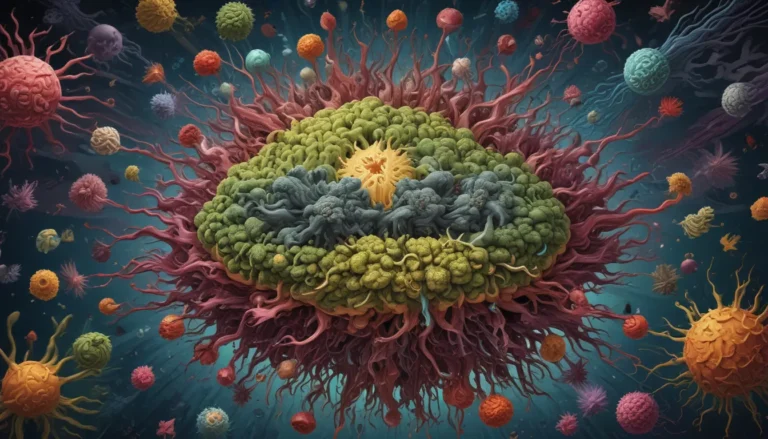A Note About Images: The images used in our articles are for illustration purposes only and may not exactly match the content. They are meant to engage readers, but the text should be relied upon for accurate information.
Welcome to the fascinating world of cell cycle regulation, a process that orchestrates the growth and reproduction of cells in all living organisms. Delving into the intricacies of this fundamental mechanism reveals a highly coordinated and tightly controlled series of events essential for maintaining genetic integrity and preventing disease. Join us on a journey to uncover nine extraordinary facts about cell cycle regulation and explore the remarkable complexities that govern life at a cellular level.
Understanding Cell Cycle Regulation
At its core, cell cycle regulation governs the growth, division, and reproduction of cells, ensuring their proper functioning. This highly complex process involves a network of genes, proteins, and external signals that work together to orchestrate cell division and maintain cellular health. Consider cell cycle regulation as a traffic cop for cells, acting as a quality control system that prevents errors and safeguards genetic material.
The Guardians of Genomic Integrity: Cell Cycle Checkpoints
Throughout the cell cycle, various checkpoints act as sentinels, monitoring the integrity of genetic material. These checkpoints serve as quality control mechanisms, halting the cell cycle if DNA damage or errors are detected. By maintaining genomic stability, these checkpoints reduce the risk of mutations and ensure the accurate replication and distribution of genetic material.
The Dance of Cyclins and CDKs in Cell Cycle Progression
Central to cell cycle regulation are proteins known as cyclins and cyclin-dependent kinases (CDKs). Cyclins interact with CDKs, activating them to phosphorylate target proteins that drive cell cycle progression. The levels of cyclins fluctuate throughout the cell cycle, providing precise control over cell division and ensuring the orderly progression of events.
Balancing Act: Tumor Suppressor Genes and Cell Cycle Regulation
Tumor suppressor genes play a critical role in regulating cell cycle progression, helping to prevent uncontrolled cell division and the formation of tumors. Mutations in these genes can disrupt the delicate balance of cell cycle regulation, leading to abnormal cell growth and potentially contributing to disease development.
The Dual Nature of Proto-oncogenes in Cell Cycle Control
Proto-oncogenes are normal genes involved in cell growth and division, but mutations or activation can transform them into oncogenes. These altered genes promote uncontrolled cell cycle progression, potentially leading to cancer development. Understanding the interplay between proto-oncogenes and cell cycle regulation is crucial for unraveling the complexities of disease.
External Signals: Influencing Cell Cycle Regulation from Beyond
While internal factors play a significant role in cell cycle regulation, external signals such as growth factors and hormones can also influence cell division. These signals act as cues that promote or inhibit cell cycle progression based on the organism’s needs, highlighting the dynamic interplay between cells and their environment.
The Rhythm of DNA Replication in the S Phase
The S phase of the cell cycle is dedicated to DNA replication, ensuring the accurate duplication of genetic material. This meticulous process guarantees that each daughter cell receives a complete and identical set of chromosomes, laying the foundation for genetic fidelity and cellular function.
Mitosis: Ensuring Genetic Equilibrium through Cell Division
Mitosis is the phase of the cell cycle where duplicated chromosomes are divided equally between two daughter cells. This essential process ensures the precise distribution of genetic material, maintaining the genetic integrity of each cell and enabling proper cellular function.
Guarding Against Cellular Chaos: Consequences of Cell Cycle Dysregulation
Disruption of cell cycle regulation can have severe consequences, leading to abnormal cell division and various diseases, including cancer. Understanding the nuances of cell cycle regulation is paramount for developing targeted therapies and interventions that can mitigate these conditions and restore cellular balance.
Unraveling the Mysteries of Cell Cycle Regulation
Embark on a journey of discovery as we unravel the complexities of cell cycle regulation. From the intricate checkpoints safeguarding genetic integrity to the dynamic interplay of internal and external factors, each facet offers a unique perspective on the fundamental processes that underpin life itself. By delving into these intricacies, scientists gain valuable insights into disease mechanisms and potential therapeutic interventions.
FAQ: Your Questions Answered
-
Q: What is the cell cycle?
A: The cell cycle is a series of events in a cell leading to its division and the production of two daughter cells. -
Q: Why is cell cycle regulation important?
A: Cell cycle regulation ensures accurate cell division and timing, crucial for preventing diseases like cancer. -
Q: How is the cell cycle regulated?
A: A complex network of proteins and signaling pathways coordinates DNA replication, cell division, and growth. -
Q: Can cell cycle regulation be disrupted?
A: Yes, genetic mutations, environmental factors, or signaling errors can disrupt cell cycle regulation, leading to abnormal growth. -
Q: How is cell cycle regulation related to cancer?
A: Dysregulation of the cell cycle, often caused by mutations, can contribute to cancer development and progression. -
Q: Are there treatments targeting cell cycle regulation?
A: Certain cancer therapies target cell cycle processes to inhibit cancer cell growth and proliferation. -
Q: Can cell cycle regulation be manipulated for regenerative medicine?
A: Researchers are exploring ways to manipulate cell cycle regulation to promote tissue regeneration and repair in regenerative medicine approaches.
Exploring Cell Cycle Regulation: A Continual Quest for Knowledge
As we conclude our exploration of cell cycle regulation, we reflect on the profound impact this process has on the intricate workings of living organisms. By unraveling its mysteries, we unlock valuable insights into disease mechanisms, aging, and regenerative medicine. The journey of discovery continues, as scientists delve deeper into the complexities of cell cycle regulation, paving the way for innovative treatments and interventions that harness the beauty and complexity of cellular processes.
Join us in celebrating the wonders of cell cycle regulation, a testament to the remarkable complexity and beauty of the biological processes that sustain life. Through understanding and appreciating the intricacies of cell cycle regulation, we move closer to unraveling the secrets of life itself and unlocking the potential for transformative advancements in modern medicine.
Remember, each fact on our site is contributed by real users like you, ensuring a wealth of diverse insights and information. Trust in our commitment to delivering engaging and trustworthy content as you continue to explore and learn with us. Thank you for joining us on this enlightening journey through the extraordinary world of cell cycle regulation.






